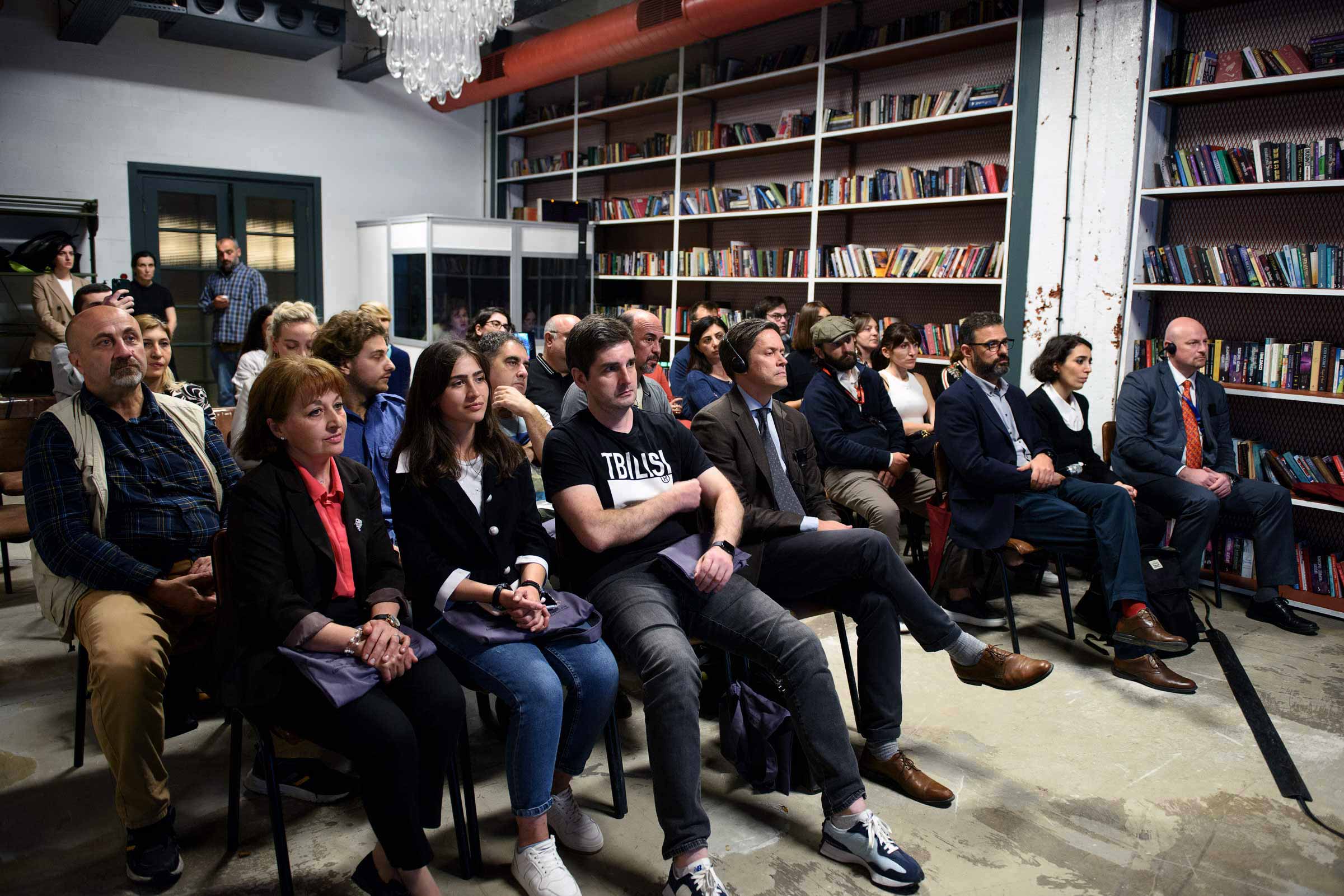Georgia: Peace Prize Winners Tell Tales of Reconciliation
“The root of the intractability of the conflict is the alienation between the parties.”
A series of unique documentaries supported by IWPR shed light on unreported stories of healing between the conflict-divided communities in the occupied regions of Georgia.
The films were produced by the winners of the European Union Monitoring Mission (EUMM) Special Prize for Peace Journalism, a prestigious annual award funded by the EUMM and managed in partnership with IWPR.
“The root of the intractability of the conflict is the alienation between the parties,” Nino Gelashvili, editor of Radio Liberty's Echo of the Caucasus, told IWPR after attending a screening. “Through our perspective, the other side is just a sworn enemy. We know nothing about our fellow citizens from Abkhazia and South Ossetia behind the barbed wire.”
She continued, “Sharing honest human feelings and experiences for me is like a window that makes us look into a different reality. This is what makes these films a powerful tool for peacebuilding advocacy.”
More than 300 media professional, activists, students and academics have already attended screenings followed by public discussions in Tbilisi and the regions of Georgia.
Tbilisi’s Ivane Javakhishvili State University has added the film series to its curriculum at the Faculty of Social and Political Sciences as a teaching supplement, meaning that from next year thousands of students will have the opportunity to see the documentaries.
Before the pandemic, the EUMM Special Prize for Peace Journalism involved a one-month fellowship at IWPR head office in London. Following the introduction of Covid-19 restrictions, the prize was altered to funding a media product related to lives of conflict-affected communities in Georgia.
The first film in the series was Siskin, produced by Mamuka Kuparadze, the founder of Studio RE and the winner of the 2019 prize. Kuparadze spent several months shooting the film around the borderline villages of Nikozi, Shindisi, Mereti, Koshka and Zardiaantkari in the Shida Kartli region.
“The dividing line is where the real heroes live,” the filmmaker said. “It is a piece of land turned into a foreign body not only for Ossetians in Tskhinvali, but also for ethnic Georgians from other regions of my homeland.”
The film’s protagonist, an elderly man nicknamed Siskin, refuses to abandon his house and lands despite the dangers.
“Everyone knows that there is a creeping occupation in Shida Kartli region, that after the 2008 Russian-Georgian war the border started moving and swallowing our territories step by step, that people living near the borderline villages are kidnapped, imprisoned, or even killed there visiting their own houses, apple orchards or cemeteries,” said Kuparadze. “I tried to put a human face on it all…all social injustices can be seen clearly through the daily life of this person with enviable endurance and endless hope.”

Haztag-Separating Inseparable, by Ketevan Magradze, is a short documentary following the personal stories of the ethnic Ossetian community in Georgia’s Kakheti region, countering stereotypes that persist across the conflict divide.
Magradze, recipient of the 2020 prize, dedicated a summer to traveling to ethnic Ossetian villages in the Kakheti and Kartli regions, meeting the significant community of ethnic Ossetians who chose not to emigrate. This community acts as a bridge between those who stayed and those who fled during the conflicts of the late '80s and early '90s.
My Links to Abkhazia is a film that tells a story of how younger people see coexistence between Abkhaz and Georgians.
Zviad Mchedlishvili, a journalist for Radio Free Europe/Radio Liberty and winner of the 2021 Prize, explored the attitudes of a post-conflict generation.
“Instead of politics or conflict analysis, my film focuses on the ordinary life of Georgians. As such, it is dedicated to young people for whom Abkhazia has not been just a breakaway region, but part of their identity,” Mchedlishvili told IWPR.
The Legacy of Muhajirs follows a young Muslim woman who lives in Batumi, the coastal city on the Black Sea. Neriman Ashlarba is a descendant of the Abkhaz Muhajirs who has steadfastly protected traditions handed down from her ancestors.
The Muhajir movement was a Russian imperial migration policy that saw the mass exile of some 50,000 Abkhaz to the Ottoman Empire in 1867-1877.
“My aim was to show through one girl's ordinary life, the tragedy of the Abkhaz Muhajirs, the present and the future possibilities of their descendants settled in Adjara on the Black Sea coast of Georgia,” said the film’s director, Radio Free Europe/Radio Liberty journalist Lela Kunchulia.
“I believe it is important to tell such stories where empathy and respect prevail over hate speech towards anything that is – or may even only look – different, because conflicts and wars very often start with framing anything unknown or foreign as ‘the other,’ as ‘the enemy,’” said Dimitrios Karabalis, head of the EUMM in Georgia.
“Respecting ethnic and religious diversity is therefore very important, since it not only makes us richer as humans and societies, but also leads to a more sustainable peace."
